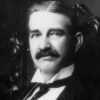L. Frank Baum

L. Frank Baum
Lyman Frank Baum, better known by his pen name L. Frank Baum, was an American author chiefly known for his children's books, particularly The Wonderful Wizard of Oz. He wrote thirteen novel sequels, nine other fantasy novels, and a host of other works, and made numerous attempts to bring his works to the stage and screen. His works anticipated such century-later commonplaces as television, augmented reality, laptop computers, wireless telephones, women in high risk, action-heavy occupations, and the ubiquity of...
NationalityAmerican
ProfessionAuthor
Date of Birth15 May 1856
CountryUnited States of America
Dorothy said nothing. Oz had not kept the promise he made her, but he had done his best. So she forgave him. As he said, he was a good man, even if he was a bad Wizard.
It is such an uncomfortable feeling to know one is a fool.
Mortals seldom know how greatly they are influenced by fairies, knooks and ryls, who often put thoughts into their heads that only the wise little immortals could have conceived.
One can be ugly in looks, but lovely in disposition.
For I consider brains far superior to money in every way. You may have noticed that if one has money without brains, he cannot use it to his advantage; but if one has brains without money, they will enable him to live comfortably to the end of his days.
Toto did not really care whether he was in Kansas or the Land of Oz so long as Dorothy was with him; but he knew the little girl was unhappy, and that made him unhappy too.
Oh, if Shakespeare says it, that's all right.
To 'know Thyself' is considered quite an accomplishment.
All the same,' said the Scarecrow, 'I shall ask for brains instead of a heart; for a fool would not know what to do with a heart if he had one.' I shall take the heart,' returned the Tin Woodman, 'for brains do not make one happy, and happiness is the best thing in the world.
…and the next moment all of them were filled with wonder. For they saw, standing in just the spot the screen had hidden, a little old man, with a bald head and a wrinkled face, who seemed to be as much surprised as they were.
I'll miss you most of all scarecrow.
I have a feeling we're not in Kansas anymore.
There is no place like home.
My world, my world... How can such a good little girl like you destroy all of my beautiful wickedness. - Wicket Witch of the North